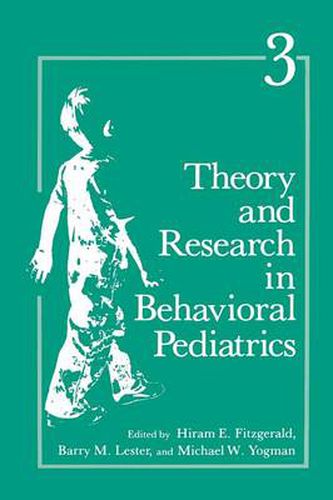Readings Newsletter
Become a Readings Member to make your shopping experience even easier.
Sign in or sign up for free!
You’re not far away from qualifying for FREE standard shipping within Australia
You’ve qualified for FREE standard shipping within Australia
The cart is loading…






This title is printed to order. This book may have been self-published. If so, we cannot guarantee the quality of the content. In the main most books will have gone through the editing process however some may not. We therefore suggest that you be aware of this before ordering this book. If in doubt check either the author or publisher’s details as we are unable to accept any returns unless they are faulty. Please contact us if you have any questions.
Volume 1 of Theory and Research in Belwvioral Pediatrics drew attention to issues related to the assessment of the preterm infant, to organizational processes in infant development, and to the systemic nature of caregiver-infant relationships. Vol- ume 2 continued the theme of systemic organization while ex- amining various contextual and ecological factors that affect development during infancy and childhood. Volume 3 con- tinues these themes. Interdisciplinary and cross-disciplinary studies, cross-cul- tural comparisons, prospective longitudinal designs, and so- phisticated multivariate correlational models have encouraged developmentalists to formulate new conceptualizations of the dynamic relationships among those organismic, transactional, and ecological variables that regulate organizational processes. As a result, many traditional models of development have been discarded or, at minimum, have been markedly transformed. Similarly, many time-honored facts of development have been seriously challenged both theoretically and empirically. In Chapter 1, Philip R. Zelazo challenges traditional ap- proaches to infant developmental assessment. Zelazo goes a step beyond noting the poor predictive validity of infant devel- opmental examinations, by arguing that such examinations bias the evaluation of infants with handicapping conditions. The emphasis in standard developmental examinations on motor performance, receptive language, and behavioral compliance Vll Vlll PREFACE works against infants whose handicapping conditions involve neuromotor, attentional, or auditory dysfunctions. Zelazo’s pro- posed alternative is to directly assess mental activity using cog- nitive-behavioral measures of mental competence derived from central processing models of schema formation.
$9.00 standard shipping within Australia
FREE standard shipping within Australia for orders over $100.00
Express & International shipping calculated at checkout
Stock availability can be subject to change without notice. We recommend calling the shop or contacting our online team to check availability of low stock items. Please see our Shopping Online page for more details.
This title is printed to order. This book may have been self-published. If so, we cannot guarantee the quality of the content. In the main most books will have gone through the editing process however some may not. We therefore suggest that you be aware of this before ordering this book. If in doubt check either the author or publisher’s details as we are unable to accept any returns unless they are faulty. Please contact us if you have any questions.
Volume 1 of Theory and Research in Belwvioral Pediatrics drew attention to issues related to the assessment of the preterm infant, to organizational processes in infant development, and to the systemic nature of caregiver-infant relationships. Vol- ume 2 continued the theme of systemic organization while ex- amining various contextual and ecological factors that affect development during infancy and childhood. Volume 3 con- tinues these themes. Interdisciplinary and cross-disciplinary studies, cross-cul- tural comparisons, prospective longitudinal designs, and so- phisticated multivariate correlational models have encouraged developmentalists to formulate new conceptualizations of the dynamic relationships among those organismic, transactional, and ecological variables that regulate organizational processes. As a result, many traditional models of development have been discarded or, at minimum, have been markedly transformed. Similarly, many time-honored facts of development have been seriously challenged both theoretically and empirically. In Chapter 1, Philip R. Zelazo challenges traditional ap- proaches to infant developmental assessment. Zelazo goes a step beyond noting the poor predictive validity of infant devel- opmental examinations, by arguing that such examinations bias the evaluation of infants with handicapping conditions. The emphasis in standard developmental examinations on motor performance, receptive language, and behavioral compliance Vll Vlll PREFACE works against infants whose handicapping conditions involve neuromotor, attentional, or auditory dysfunctions. Zelazo’s pro- posed alternative is to directly assess mental activity using cog- nitive-behavioral measures of mental competence derived from central processing models of schema formation.